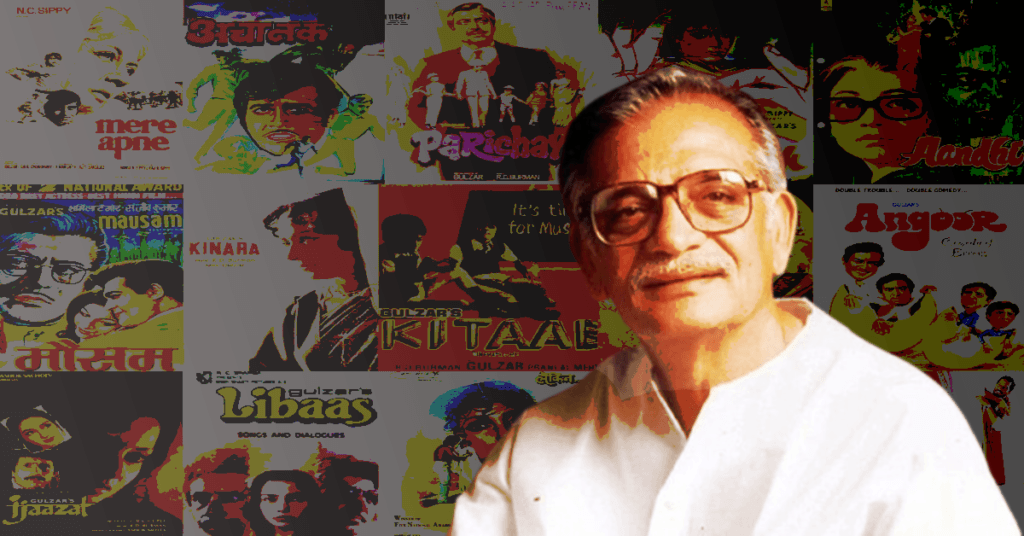Gulzar is not just a name; he is an institution of poetry, storytelling, and emotions. His words have shaped the very soul of Indian cinema, lending depth and meaning to countless films with his evocative lyrics. A single verse from his pen can stir emotions, evoke nostalgia, and capture the essence of life itself. His poetry breathes life into melodies, turning songs into experiences that transcend time. Yet, in this overwhelming brilliance as a lyricist, another side of Gulzar, one equally profound, has often been overlooked: his exceptional craft as a filmmaker.
While his lyrics have immortalized him in popular culture, his directorial ventures remain an underappreciated treasure trove of artistic depth. He was not just a director; he was a poet behind the camera, painting stories with the same sensitivity, nuance, and soulfulness that he brought to his words. His films were not merely narratives but deeply introspective journeys, exploring the human psyche, social structures, and the unspoken conflicts of life. However, in a film industry where music often overpowers storytelling, Gulzar’s legacy as a director has remained in the shadows of his own lyrical genius.
Despite winning a National Award for Best Director and helming some of the most critically acclaimed films of the 1970s and 1980s, he is rarely counted among the greatest Indian directors. This is not because his films lacked merit, but because his own words—his poetry and songs—became larger than life, eclipsing the cinematic brilliance he brought to the screen.
Gulzar’s filmmaking style stands apart from the typical Bollywood formula of his time. His films were often intimate character studies rather than grand spectacles. He focused on small moments, unspoken emotions, and the internal conflicts of his characters. Unlike commercial cinema, which relied on melodrama, Gulzar’s films captured raw emotions with quiet intensity. His use of symbolism, poetic dialogues, and layered storytelling created films that were both artistically rich and deeply impactful.
Exploring Shades of Human Relationships
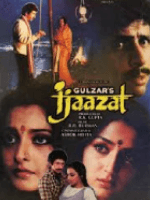 One of Gulzar’s strongest storytelling traits was his ability to dissect human relationships with extraordinary sensitivity. His films explored love, separation, loneliness, and the fragile nature of emotions. A deeply moving drama, Mausam (1975) tells the story of a man (Sanjeev Kumar) who returns years later to search for his lost love, only to find her daughter (Sharmila Tagore), who has suffered a tragic fate. The film explores themes of regret, redemption, and the weight of past choices. With its haunting music and poetic storytelling, Mausam won the National Film Award for Best Feature Film. Similarly, Ijaazat (1987) explores the unresolved emotions between a man (Naseeruddin Shah) and two women (Rekha and Anuradha Patel), touching on the bittersweet nature of love and nostalgia. Its song Mera Kuch Saaman became an iconic expression of longing.
One of Gulzar’s strongest storytelling traits was his ability to dissect human relationships with extraordinary sensitivity. His films explored love, separation, loneliness, and the fragile nature of emotions. A deeply moving drama, Mausam (1975) tells the story of a man (Sanjeev Kumar) who returns years later to search for his lost love, only to find her daughter (Sharmila Tagore), who has suffered a tragic fate. The film explores themes of regret, redemption, and the weight of past choices. With its haunting music and poetic storytelling, Mausam won the National Film Award for Best Feature Film. Similarly, Ijaazat (1987) explores the unresolved emotions between a man (Naseeruddin Shah) and two women (Rekha and Anuradha Patel), touching on the bittersweet nature of love and nostalgia. Its song Mera Kuch Saaman became an iconic expression of longing.
In contrast, Namkeen (1982) is a delicate exploration of the unspoken endurance of women, depicting the lives of three sisters (Sharmila Tagore, Shabana Azmi, and Kiran Vairale) in a remote village. Unlike many films that thrive on dramatic conflicts, Namkeen is marked by its quiet, poetic tone, capturing the resilience and struggles of its female characters through understated emotions.
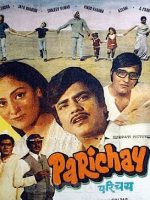 Inspired by The Sound of Music (1965), Gulzar’s directorial Parichay (1972) tells the story of a strict, authoritarian grandfather (Pran) who hires a tutor (Jeetendra) to educate and discipline his five rebellious grandchildren. What follows is a heartwarming transformation of relationships as the tutor bonds with the children, bringing warmth and joy back into their lives. Unlike mainstream Bollywood family dramas of that era, Parichay was understated and deeply emotional, relying on realistic performances and soft, melodic songs like Musafir Hoon Yaaron, which added to the film’s poetic feel. The film highlighted Gulzar’s ability to weave tenderness into everyday relationships without excessive melodrama.
Inspired by The Sound of Music (1965), Gulzar’s directorial Parichay (1972) tells the story of a strict, authoritarian grandfather (Pran) who hires a tutor (Jeetendra) to educate and discipline his five rebellious grandchildren. What follows is a heartwarming transformation of relationships as the tutor bonds with the children, bringing warmth and joy back into their lives. Unlike mainstream Bollywood family dramas of that era, Parichay was understated and deeply emotional, relying on realistic performances and soft, melodic songs like Musafir Hoon Yaaron, which added to the film’s poetic feel. The film highlighted Gulzar’s ability to weave tenderness into everyday relationships without excessive melodrama.
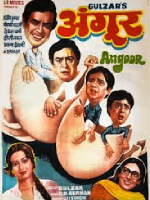 Gulzar was not restricted to serious or melancholic themes. He also proved his mastery in comedy. Gulzar’s Angoor (1982) remains one of the best comedy films ever made in Hindi cinema. Based on Shakespeare’s The Comedy of Errors, the film follows two pairs of identical twins (both played by Sanjeev Kumar and Deven Verma), leading to hilarious misunderstandings. Unlike the loud slapstick humor that dominated Bollywood comedies, Angoor relied on subtle, intelligent humor and situational comedy. The film’s brilliance lies in its perfect comic timing, sharp dialogues, and effortless storytelling, proving that Gulzar could handle humor just as masterfully as he handled deep emotions.
Gulzar was not restricted to serious or melancholic themes. He also proved his mastery in comedy. Gulzar’s Angoor (1982) remains one of the best comedy films ever made in Hindi cinema. Based on Shakespeare’s The Comedy of Errors, the film follows two pairs of identical twins (both played by Sanjeev Kumar and Deven Verma), leading to hilarious misunderstandings. Unlike the loud slapstick humor that dominated Bollywood comedies, Angoor relied on subtle, intelligent humor and situational comedy. The film’s brilliance lies in its perfect comic timing, sharp dialogues, and effortless storytelling, proving that Gulzar could handle humor just as masterfully as he handled deep emotions.
Diving into Social and Political Issues
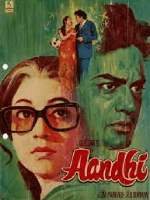 Gulzar did not limit himself to personal relationships; he also explored larger societal themes with the same poetic finesse. One of his most controversial films, Aandhi (1975), was rumored to be based on the life of Indira Gandhi, though Gulzar always denied this. The film tells the story of a woman (Suchitra Sen) who chooses her political career over her personal life, leaving behind her husband (Sanjeev Kumar). With songs like Tere Bina Zindagi Se Koi, the film beautifully portrays the sacrifices and emotional toll of ambition.
Gulzar did not limit himself to personal relationships; he also explored larger societal themes with the same poetic finesse. One of his most controversial films, Aandhi (1975), was rumored to be based on the life of Indira Gandhi, though Gulzar always denied this. The film tells the story of a woman (Suchitra Sen) who chooses her political career over her personal life, leaving behind her husband (Sanjeev Kumar). With songs like Tere Bina Zindagi Se Koi, the film beautifully portrays the sacrifices and emotional toll of ambition.
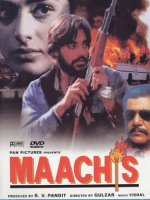 Another political thriller in Gulzar’s filmography, Maachis was a powerful take on terrorism and the consequences of state violence. Set against the backdrop of the Punjab insurgency, the film follows the transformation of a young man (Chandrachur Singh) into a militant after witnessing police brutality. The film’s raw realism, haunting music (Chhod Aaye Hum Woh Galiyan), and Gulzar’s poetic yet hard-hitting dialogues made it one of his most impactful films. Maachis was not just a story about terrorism but a deep reflection on how violence breeds violence, making it a standout work in Indian cinema.
Another political thriller in Gulzar’s filmography, Maachis was a powerful take on terrorism and the consequences of state violence. Set against the backdrop of the Punjab insurgency, the film follows the transformation of a young man (Chandrachur Singh) into a militant after witnessing police brutality. The film’s raw realism, haunting music (Chhod Aaye Hum Woh Galiyan), and Gulzar’s poetic yet hard-hitting dialogues made it one of his most impactful films. Maachis was not just a story about terrorism but a deep reflection on how violence breeds violence, making it a standout work in Indian cinema.
Gulzar’s Experimental Themes
Gulzar wasn’t afraid to experiment with storytelling and form. Some of his films took on psychological and surreal elements that were rare in mainstream Hindi cinema. A film told from the viewpoint of a child, Kitaab (1977) explores the disillusionment that comes with growing up. Unlike traditional coming-of-age films, it does not romanticize childhood but instead presents it as a phase filled with confusion, harsh realities, and loss of innocence. Gulzar’s film Libaas, remained unreleased for years due to its bold subject matter, Libaas explores extra-marital relationships and the suffocation of societal norms. The film, starring Naseeruddin Shah and Shabana Azmi, challenges conventional ideas about love and marriage, making it one of Gulzar’s most daring works.
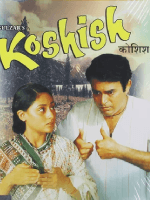 Gulzar went on to make one of the earliest Indian films to depict the lives of the differently-abled, Koshish (1972) follows the story of a deaf and mute couple (played by Sanjeev Kumar and Jaya Bhaduri) as they navigate life’s challenges. The film was ahead of its time, focusing on inclusivity and the resilience of the human spirit. Gulzar’s sensitive portrayal made it one of the most respected films of its era.
Gulzar went on to make one of the earliest Indian films to depict the lives of the differently-abled, Koshish (1972) follows the story of a deaf and mute couple (played by Sanjeev Kumar and Jaya Bhaduri) as they navigate life’s challenges. The film was ahead of its time, focusing on inclusivity and the resilience of the human spirit. Gulzar’s sensitive portrayal made it one of the most respected films of its era.
Directorial Techniques of Gulzar
Gulzar’s cinematic style is inseparable from his lyricism, and his direction mirrored the same poetic sensibilities that defined his songs. He often used slow pacing, close-ups, and naturalistic lighting to create intimate, reflective spaces on screen. His framing was meticulous, emphasizing small moments and unspoken emotions. His use of silence was just as powerful as his dialogue, allowing the visual composition to speak volumes.
Gulzar’s films stand in stark contrast to the more grandiose works of his contemporaries. While directors like Satyajit Ray focused on social realism and Hrishikesh Mukherjee brought subtlety to mainstream cinema, Gulzar carved a unique niche by blending poetry with storytelling. His films were deeply introspective, focusing on the internal worlds of his characters rather than the external drama. Unlike the stark realism of Ray or the warmth of Mukherjee’s humanism, Gulzar’s cinema was poetic, almost dreamlike, using visual metaphors to express the inexpressible.
Legacy as a Director
Though he eventually moved away from directing films, Gulzar left behind a body of work that remains unparalleled in its depth, sensitivity, and artistic brilliance. His contribution to Indian cinema is undeniable. Whether exploring love, politics, or social issues, Gulzar’s films always carried a rare poetic touch, making them unforgettable experiences. His ability to tell deeply human stories with profound simplicity is what makes him a master not just of words, but also of images.
As audiences rediscover his work, it is important to recognize the immense contribution he made to Indian cinema not just as a poet, but as a visionary director. Gulzar’s films deserve a place in the spotlight, and it is time for his directorial genius to be celebrated with the same fervor as his lyrical contributions. Let us revisit his films, explore the lesser-known gems, and appreciate the quiet genius that Gulzar brought to the silver screen.
Read More:
